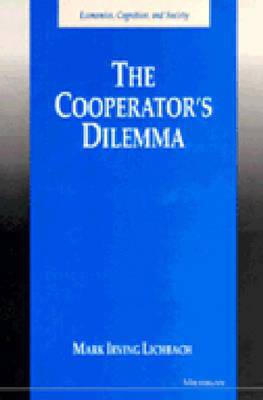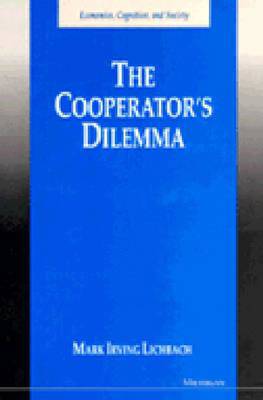
Bedankt voor het vertrouwen het afgelopen jaar! Om jou te bedanken bieden we GRATIS verzending (in België) aan op alles gedurende de hele maand januari.
- Afhalen na 1 uur in een winkel met voorraad
- In januari gratis thuislevering in België
- Ruim aanbod met 7 miljoen producten
Bedankt voor het vertrouwen het afgelopen jaar! Om jou te bedanken bieden we GRATIS verzending (in België) aan op alles gedurende de hele maand januari.
- Afhalen na 1 uur in een winkel met voorraad
- In januari gratis thuislevering in België
- Ruim aanbod met 7 miljoen producten
Zoeken
The Cooperator's Dilemma
€ 122,45
+ 244 punten
Omschrijving
In The Cooperator's Dilemma, Mark Lichbach provides an up-to-date and complete evaluation of the collective-action approach. A special strength of the work is that it integrates in a unique way both game theoretic and micro- economics approaches to the collective-action problem. Prisoner's Dilemma and public goods issues are thus discussed with a common collective-action framework. Another distinctive feature is the author's development and application of a unique typology of solutions to the collective-action solutions he labels: market, community, contract and hierarchy.
In the comprehensive review of collective-action theories, two criteria are employed to evaluate them. First, the logical completeness of every collective- action solution is considered. Lichbach argues that each type of solution presupposes the existence of at least one other type of solution. Trying to solve the problems of social order and collective- action thus leads one in a vicious circle since no solution seems to guarantee collective- action. While each type of solution might be necessary to either create, maintain or transform collective action, taken independently none is sufficient. To overcome the "incompleteness" problem, the book suggest that we investigate combinations of solutions to the collective-action problem. Second, every solution is evaluated from the point of view of logical consistency with the core assumptions of the collective- action approach. Many recent solutions to the collective-action problem have pushed back the limits of rational- choice explanations. Analysts have tried to synthesize noneconomic variables into economic models. Collective-action arguments have been extended to explain, for example, norms, trust ideology, reputation, institutions and leadership. It has to be questioned whether these recent extensions truly represent "progress."
Mark Irving Lichbach is Professor of Government and Politics, University of Maryland.
In the comprehensive review of collective-action theories, two criteria are employed to evaluate them. First, the logical completeness of every collective- action solution is considered. Lichbach argues that each type of solution presupposes the existence of at least one other type of solution. Trying to solve the problems of social order and collective- action thus leads one in a vicious circle since no solution seems to guarantee collective- action. While each type of solution might be necessary to either create, maintain or transform collective action, taken independently none is sufficient. To overcome the "incompleteness" problem, the book suggest that we investigate combinations of solutions to the collective-action problem. Second, every solution is evaluated from the point of view of logical consistency with the core assumptions of the collective- action approach. Many recent solutions to the collective-action problem have pushed back the limits of rational- choice explanations. Analysts have tried to synthesize noneconomic variables into economic models. Collective-action arguments have been extended to explain, for example, norms, trust ideology, reputation, institutions and leadership. It has to be questioned whether these recent extensions truly represent "progress."
Mark Irving Lichbach is Professor of Government and Politics, University of Maryland.
Specificaties
Betrokkenen
- Uitgeverij:
Inhoud
- Aantal bladzijden:
- 336
- Taal:
- Engels
- Reeks:
Eigenschappen
- Productcode (EAN):
- 9780472105724
- Verschijningsdatum:
- 19/06/1996
- Uitvoering:
- Hardcover
- Formaat:
- Genaaid
- Afmetingen:
- 161 mm x 236 mm
- Gewicht:
- 739 g

Alleen bij Standaard Boekhandel
+ 244 punten op je klantenkaart van Standaard Boekhandel
Beoordelingen
We publiceren alleen reviews die voldoen aan de voorwaarden voor reviews. Bekijk onze voorwaarden voor reviews.








